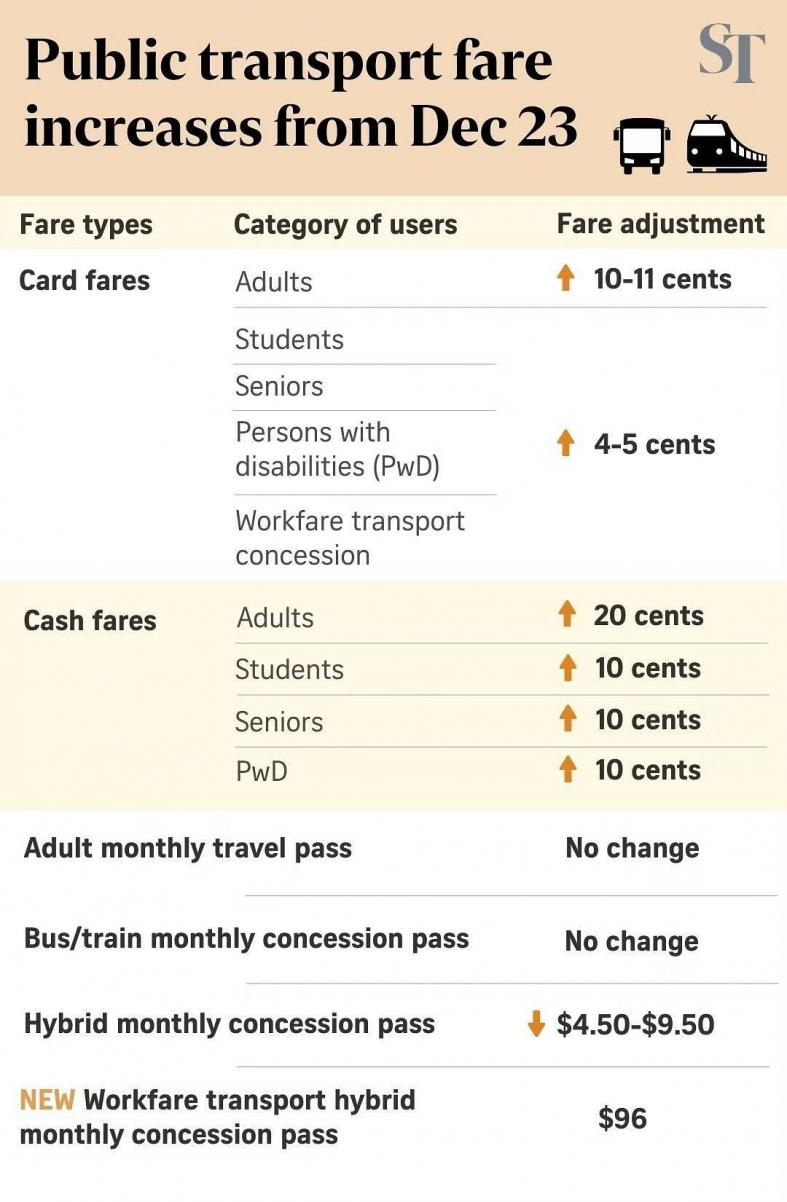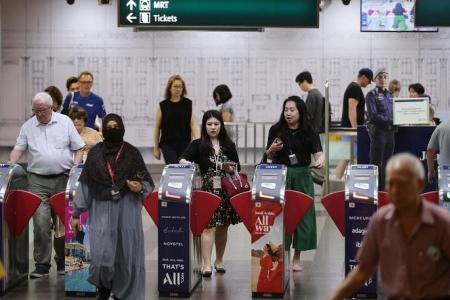Bus, train fares to rise by up to 11 cents for adults; new $96 concession pass for low-wage workers
From Dec 23, public transport fares for adults who pay by card will climb by up to 11 cents, as the overall cost of bus and train rides goes up by 7 per cent.
Adult card fares will increase by 10 cents for journeys of up to 4.2km and 11 cents for rides beyond 4.2km, the Public Transport Council (PTC) said on Monday after it concluded its yearly fare review exercise.
Concessionary fares for seniors, students, people with disabilities and low-wage workers who pay by card will go up by four cents for journeys of up to 4.2km and five cents for longer rides. About two million commuters, or half of Singaporeans, are in this group.
This year’s increase is the steepest since the hike in 2019, when fares also rose by 7 per cent. The 11-cent hike is also the highest on record.
The PTC said fares could have gone up by 22.6 per cent in 2023 – the highest allowable increase since 1998, when the council began using formulas to set a cap on fare changes.
This comprises a 12 per cent increase derived from a new fare formula introduced for the 2023 exercise, as well as a 10.6 per cent hike rolled over from the 2022 exercise, said the PTC.
The 2023 adjustment was spurred largely by a 62.3 per cent rise in energy prices in 2022, as well as growth in core inflation and wages, said the council.
Transport operators SBS Transit and SMRT Trains had applied for the full 22.6 per cent hike in 2023, citing reasons such as higher energy prices, a competitive labour market, as well as a slow and uncertain recovery in ridership.
Public transport ridership remains at about 90 per cent of pre-Covid-19 levels.
PTC said it decided against granting the full increase, to keep fares affordable in the present “higher-cost environment”.
The remaining increase of 15.6 per cent will be postponed to future fare review exercises.
PTC said this deferment was possible because the Government is providing an extra $300 million in public transport subsidies in 2024, on top of the more than $2 billion in subsidies it already shells out every year to keep services running.
“The additional government subsidy will help to moderate the level of fare increase needed to keep pace with the higher cost of providing public transport, while keeping fares affordable for commuters,” the council added.

The Ministry of Transport said operators will “have to manage their costs tightly, do more with less, and continue to pay fair wages to their workers”.
Fares rose by 2.9 per cent in 2022 and 2.2 per cent in 2021. In 2020, there was a freeze on fares to help commuters cope with the economic impact of Covid-19.
The PTC said on Monday that adults paying cash for bus rides will have to fork out 20 cents more, while concessionary cash fares for students, seniors and people with disabilities will rise by 10 cents.
Less than 1 per cent of commuters pay cash for bus rides.
New monthly concession pass for low-wage workers
Meanwhile, the Government will introduce a monthly hybrid – or bus and train – concession travel pass for low-wage workers costing $96 from Dec 23. This is $32 off the price of adult monthly travel passes, which will stay unchanged at $128.
The cost of monthly hybrid travel passes for other concessionary groups – including seniors, national servicemen and students – will come down by up to 10 per cent, or between $4.50 and $9.50.
The cost of a monthly concession pass for those with disabilities will also be reduced from $64 to $58 – the same as that for seniors.
These passes allow unlimited travel on all modes of public transport except express buses.
About 60,000 people are expected to benefit from these moves. These include existing holders of monthly passes as well as those expected to buy them, said the PTC.
To help Singaporeans cope with the fare increase, the Government will provide public transport vouchers worth $50 each to resident households with a monthly income of up to $1,600 per person.
These vouchers can be used to top up fare cards or buy monthly passes. In 2022, it made available 600,000 public transport vouchers worth $30 each.
In line with the steeper fare hike in 2023, PTC said it would require SBS Transit and SMRT Trains to make larger contributions to the Public Transport Fund, which helps households cope with fare increases.
SBS Transit will have to contribute 15 per cent of its expected revenue increase, or $3.14 million, and SMRT Trains will have to dish out 30 per cent of the same, or $12.71 million.
PTC said its data shows that fares remain affordable.
On average, households in the 21st to 40th percentile – the average public transport user – spent 1.7 per cent of their monthly income on public transport in 2022, compared with 1.8 per cent in 2021.
Lower-income households in the 11th to 20th percentile spent about 2.4 per cent of their income on public transport in 2022 – down from 2.5 per cent in 2021.
After accounting for the fare and wage increases in 2023, households are expected to spend roughly the same proportion of their income on public transport as they did in 2022, said the council.
Get The New Paper on your phone with the free TNP app. Download from the Apple App Store or Google Play Store now

